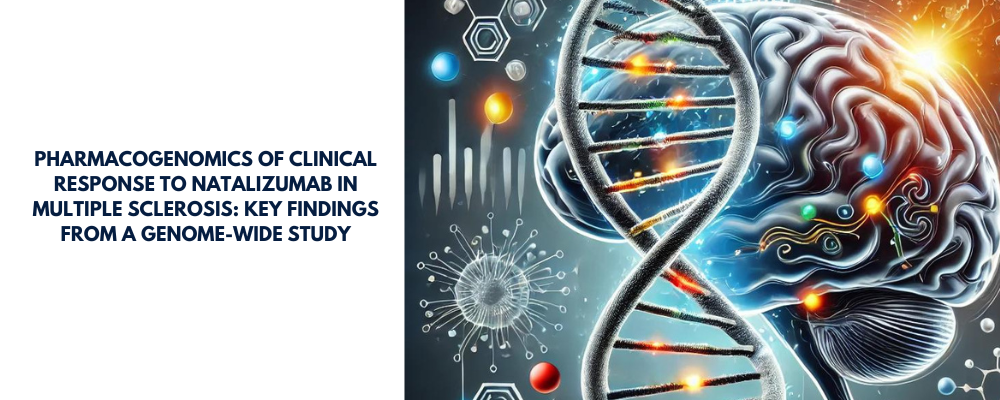Pharmacogenomics of Clinical Response to Natalizumab in Multiple Sclerosis: Key Findings from a Genome-Wide Study

In the ever-evolving landscape of multiple sclerosis (MS) research, pharmacogenomics holds promise in individualizing treatment strategies. The recently published genome-wide association study (GWAS) by Ferdinando Clarelli et al., titled "Pharmacogenomics of clinical response to Natalizumab in multiple sclerosis," provides important insights into genetic predictors of treatment response. Natalizumab (NTZ), a widely used disease-modifying therapy for relapsing-remitting MS (RRMS), shows significant efficacy, yet 25% of patients exhibit suboptimal or no response. This multi-centric study, conducted across Italy, Germany, and Sweden, addresses the critical need to identify biomarkers that could guide treatment decisions, thereby enhancing personalized medicine in MS.
Study Design and Methods
The study included 1834 MS patients from three European countries: 119 from Italy, 81 from Germany, and 1634 from Sweden. Patients were followed over four years, with treatment response categorized dichotomously—responders (R) were those who remained relapse-free, while non-responders (NR) experienced one or more relapses. The analysis included around 4.7 million imputed autosomal single-nucleotide polymorphisms (SNPs) and applied logistic regression models, adjusting for clinical covariates such as age, disease duration, and prior relapses. Furthermore, the authors conducted pathway and network analysis to elucidate the molecular mechanisms behind the genetic associations.
Key Genetic Findings
The top-associated genetic variant was rs11132400T, located in the F11-AS1 gene on chromosome 4, which had an odds ratio of 0.58 and a p-value of 1.33 × 10^-6. This SNP exhibited effects on several genes in its locus, including KLKB1, a gene encoding prekallikrein, a protein involved in maintaining blood-brain barrier (BBB) integrity. The study also highlighted other top-associated variants, such as rs12885261T, which influences the expression of ARG2 (arginase 2) and plays a role in regulating immune responses. While no SNP reached genome-wide significance, these suggestive associations underscore the complexity of MS pharmacogenomics.
Interactome Analysis
In addition to SNP-level analysis, the authors projected the genetic signals onto the STRING interactome, revealing a module of 135 genes with enriched terms related to the canonical WNT signaling pathway. This pathway is crucial for BBB formation and maintenance, suggesting that its dysregulation may influence NTZ efficacy. Genes such as GRB2 and LRP6, both implicated in MS pathogenesis, were identified as hub genes in this network. These findings reinforce the importance of the WNT/β-catenin signaling pathway in MS and its potential as a target for future therapeutic strategies.
Challenges and Future Directions
Despite the promising results, the study also highlights several challenges in MS pharmacogenomics. One significant limitation is the lack of genome-wide significant variants, likely due to the study's limited power in detecting smaller effects. Moreover, the heterogeneity in clinical data collection and patient populations across different centers posed challenges in harmonizing the dataset. Future research should aim to include larger cohorts, perhaps through international collaborations, to increase statistical power and confirm these findings.
Additionally, the study's focus on relapse-based treatment response could be complemented by integrating MRI-based outcomes, which may offer a more sensitive measure of NTZ efficacy. Incorporating both clinical and neuroimaging data into future pharmacogenomic studies could provide a more comprehensive understanding of NTZ's effects on MS progression.
Conclusion
The study by Clarelli et al. represents a major step forward in understanding the genetic factors influencing response to NTZ in MS patients. While further research is needed to confirm these findings and translate them into clinical practice, this work lays the foundation for more personalized treatment approaches in MS. The identification of genetic markers related to NTZ response could revolutionize the way we manage this complex disease, moving closer to a future where treatments are tailored to each patient's unique genetic makeup.
Reference:
Clarelli, F., Corona, A., Pääkkönen, K. et al. Pharmacogenomics of clinical response to Natalizumab in multiple sclerosis: a genome-wide multi-centric association study. J Neurol (2024).
